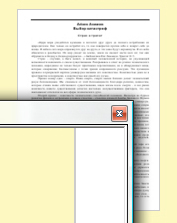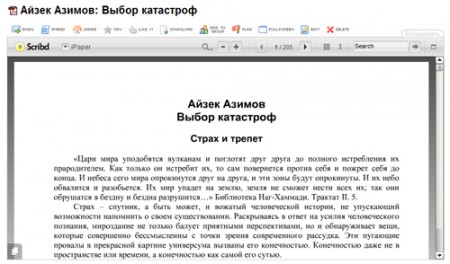Catastrophe selection

Hello, the most read nation on the planet.
You are laughing at the Large Hadron Collider, but what percentage of people writing the word “LHC” really understands what is at stake? What does “antimatter” mean, the theory of black holes, the collision of the Earth with other celestial bodies? What is the possible outcome for mankind? Every third reader? Very unlikely. To do this, you would have to have a degree in astronomy, physics, geology, and many other scientific disciplines. But, the glory of evolution, there are people who know this for us.
Surely many have heard of Isaac (originally Isaac) Asimov- An American of Russian origin born in a family of millers, a popularizer of science, biochemist and, ultimately, a science fiction writer. Over 72 years of his life, he wrote more than 500 books of various genres, ranging from scientific and journalistic materials to detective stories - this person’s entire life went with only one purpose: to convey knowledge that was difficult and not always clear to a simple average man. The words are positron, psychohistory, robotics; Three laws of robotics and the collection of stories "I, the robot"; Bible and science guides - all this has been brought to modern society by one person.

And he wrote a wonderful book, which I would like to give to the hands of the hara-people, its title: " The choice of catastrophes". This is one of Isaac Asimov’s popular scientific works, written in 1979, almost 30 years ago, but which does not lose its relevance today. When I tried to somehow describe the contents of the book, I ran into a very obvious problem. How to describe the universe? Is it possible to characterize the totality of astronomical and terrestrial factors? It is unlikely. And it’s just as difficult to write what this book is about - it’s about everything else. human -operation, explains all this in plain language, seasons and scientific substantiation, ready-made, provides the reader.
Retelling the content makes absolutely no sense - it needs to be read. Isaac Asimov, like no other writer, was able to perfectly, without the doom inherent in some authors, describe all the possible scenarios of the actual end of life in the universe, galaxy and on Earth. I distinguished between theories that we should seriously think about and those that we should not worry about because of their extremely remoteness (billions of years) or the inability to correct (the motion of the universe). Having read the book, I discovered so many new facts for myself that in any other case, I would have at least got a doctorate in “theoretical physics”.
It seems to me that there are no catastrophes of the second kind, there is no catastrophe that
cannot be avoided, there is nothing that would threaten us with inevitable
destruction to such an extent that nothing could be done about it. If we
act rationally and humanly, if we calmly approach the problems
facing the whole human race and not get into emotions about issues of the
nineteenth century, such as national security and local patriotism, if we
understand that our enemies are not at all neighbors, and poverty, ignorance and cold
indifference to the laws of nature, all the problems facing us can be solved. You can
deliberately make a choice and ultimately avoid disasters.
And if we make this choice in the twenty-first century, we can spread in
space and lose our vulnerability. We will no longer depend on one planet or
one star. And then humanity or its intelligent descendants and their allies will be able to
exist even after the Earth ceases to exist, after the
Sun ceases to exist , after (who knows?) Our Universe ceases to exist.
This is our goal. So win.
To summarize: musthave, mustread, mustknow.
Read or download this document on Scribd: Isaac Asimov: Choosing Disasters
